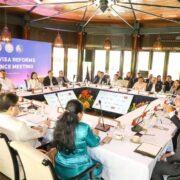The Department of Trade Industry (DTI) aims for the e-commerce sector to be valued at PHP1.2 trillion or sharing 5.5% of the economy by 2022.
From 2020’s baseline value of PHP599 billion or contributing 3.4% to gross domestic product (GDP), DTI targets e-commerce to grow its GDP share to 4.3% or infusing PHP850 billion in the domestic economy.
“Further, we hope to increase the number of e-commerce enterprises from 500,000 in 2020 to 750,000 by 2021, and 1 million by 2022,” said DTI Secretary Ramon Lopez in a virtual briefing on Friday, January 29.
Secretary Lopez added that the country should take full advantage of how the pandemic has significantly boosted the domestic l e-commerce industry.
“As our economy recovers from the pandemic, we can harness the fast-growing e-commerce in the country to boost our economic growth. We’ve already seen how e-commerce has come to our rescue – and was ready to fill the void left by brick-and-mortar businesses unable to serve our people – because of the lockdowns,” he said.
The DTI chief said that in order to grow the e-commerce industry in the Philippines, there must be fast, reliable, and affordable communications networks combined with efficient financial and logistics systems and infrastructure in place.
Further adding that the digital infrastructure should also be installed for e-government, e-commerce institutions, skills capacity and trainings.
The local e-commerce environment will also be secured by reinforcing improvements in regulations for internet transactions, established security standards, and well-informed online sellers and buyers.
“Building trust is our challenge. Unfortunately, the uptake of e-commerce has resulted in an increase in consumer complaints,” Lopez said.
According to the DTI Consumer Protection Group, complaints related to online transactions skyrocketed to 15,947 in 2020. For January 2021 alone, online complaints has already reached 857.
“For e-commerce to succeed, government and private sector must install redress mechanisms that are far more efficient than what we have today. But we must also instill values and ethics in our citizens—both merchants and consumers alike—to serve as the foundation of trust in our country’s e-commerce,” said Lopez.






